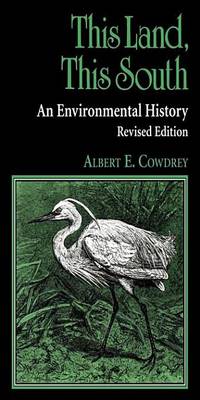Here is the story of the long interaction between humans, land, and climate in the American South. It is a tale of exploitation and erosion, of destruction, disease, and defeat, but also of the persistent search for knowledge and wisdom. It is a story whose villains were also its victims and sometimes its heroes. Ancient forces created the southern landscape, but, as Albert E. Cowdrey shows, humankind from the time of earliest habitation has been at work reshaping it. The southern Indians, far from being the "natural ecologists" of myth, radically transformed their environment by hunting and burning. Such patterns were greatly accelerated by the arrival of Europeans, who viewed the land as a commodity to be exploited for immediate economic benefit. Their greed and ignorance took a heavy toll on the land and all those it supported. Cowdrey documents not only the long decline but the painfully slow struggle to repair the damage of human folly. The eighteenth century saw widespread though ineffectual efforts to protect game and conserve the soil. In the nineteenth century the first hesitant steps were taken toward scientific flood control, forestry, wildlife protection, and improved medicine. In this century, the New Deal, the explosion in scientific knowledge, and the national environmental movement have spurred more rapid improvements. But the efforts to harness the South's great rivers, to save its wild species, and to avert serious environmental pollution have often had equivocal results.
- ISBN10 0813149169
- ISBN13 9780813149165
- Publish Date 5 February 2015 (first published 1 January 1983)
- Publish Status Active
- Publish Country US
- Imprint University Press of Kentucky
- Format eBook
- Pages 257
- Language English
